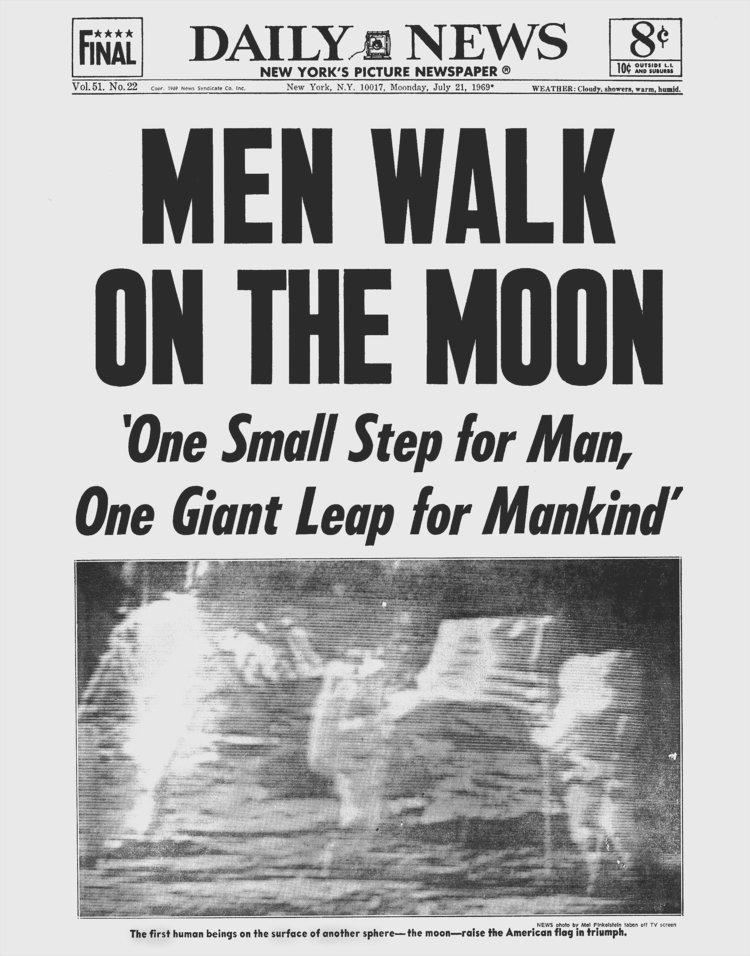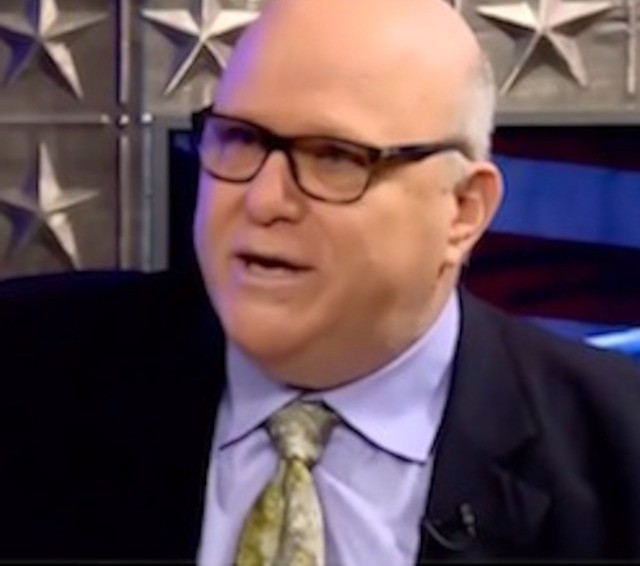The true achievement of Apollo 11
Memory foam, the Dust Buster, scratch-resistant glasses, Teflon, and other products developed as a result of the Apollo program were the least significant achievements of the moon landing fifty years ago. The Apollo 11 landing revitalized a dwindling American spirit torn apart by racial animus, nasty politics, and the fight over the Vietnam War.
It was the biggest miracle in a year of wonders. 1969 began with the New York Jets upsetting the Baltimore Colts in the Super Bowl, and toward the end of the year the Mets beat the heavily-favored Orioles to become the best baseball team in the world. But those two miracles paled in comparison to the biggest one of all: fifty years ago, on July 20th, 1969, two men walked on the moon.
As part of the generation that grew up before Twitter and Facebook, the US space program was simply the coolest thing ever. And the first two people to step on the surface of the moon, Neil Armstrong and Buzz Aldrin, were bigger heroes than Joe Namath and Tom Seaver.
Other kids collected baseball cards. I collected brochures about the space program that NASA would mail anyone who asked. Every time NASA produced a new brochure I’d tear a page out of my school notebook, put it in an envelope, get a six-cent stamp from my dad, and send it on its way. When the package of space goodies showed up in my mailbox, I read them over and over, sometimes over a glass of TANG, which I drank because it was what the astronauts drank.
Pictures of every astronaut and every spacecraft, from the first Mercury capsule through Gemini and Apollo, were tacked up on my bedroom wall, much to the chagrin of my roommate, my 20-year-old brother. Part of my photo exhibition was the LEM, the lunar excursion module built just a few miles from my house on Long Island. The LEM flew astronauts from the command module to the surface of the moon and back. And nine months after Apollo 11, it served as a life raft for the crew of Apollo 13 after their command module was disabled.
Fifty years ago, as the three Apollo 11 astronauts were heading to the moon, America was a very different place. It seemed like the country was coming apart at the seams. We were fighting amongst ourselves because of a war we couldn’t understand in a land we didn’t know, and too many of our youth were losing their lives. It seemed as if our government wasn’t letting them win.
Vietnam was the first televised war. The news was on once a day at five o’clock, just before dinner. Those daily reports helped rally parts of America against the war. Anti-war protests spread across America. To counter the protesters, many adults described themselves as part of the silent majority, adorning their cars with bumper stickers saying “America: Love It Or Leave It!”
Eventually, President Lyndon Johnson decided not to run for re-election, in part because he believed, “If I lost Walter Cronkite, I’ve lost America.”
There were over a hundred race riots in the country after the assassination of civil rights leader Reverend Dr. Martin Luther King Jr. in April 1968.
Two months later, Robert Kennedy, brother of the assassinated President John F. Kennedy, looked poised to succeed Johnson. He was killed on a June evening in Los Angeles, about to celebrate winning the California primary.
In September 1968, as Democrat were about to pick their nominee in Chicago, there were protests so violent it seemed like a war. And the violence was televised to America.
November 1968 saw the election of Richard Nixon. Those who didn’t vote for him hated almost everything he did.
Despite the fighting on the streets, the protests, and the silent majority, the entire nation united behind that one goal set by President Kennedy eight years earlier: landing people on the moon and getting them home safely. On July 20th, 1969, the whole country, perhaps the entire world, prayed for the three Apollo astronauts.
Other than the basement, the only place in my house with a TV set was my parents’ room. As Neil Armstrong was about to open the LEM door and step on the moon, I was lying down on my parent’s floor to be woken for man’s first moonwalk. But the LEM was on the moon — who could sleep?
As the astronauts waited for permission to go down to the surface, Buzz Aldrin radioed back home a message of faith. “I’d like to take this opportunity to ask every person listening in, whoever and wherever they may be, to pause for a moment and contemplate the events of the past few hours, and to give thanks in his or her own way.” He later wrote, “I could think of no better way to acknowledge the enormity of the Apollo 11 experience than by giving thanks to G-d.”
Finally, after what seemed like hours, I watched Neil Armstrong walk down the ladder of the LEM. I couldn’t help to think how amazing this country was to make this happen. And as I looked at the Earth from the moon, I thought, what a beautiful world G-d created.
That’s when I heard those famous words: “One small step for [a] man. One giant leap for mankind.” Armstrong always claimed he said the word “a.” No one heard it, but who cared — the guy was talking to us from the moon!
Joining his commander on the surface, Buzz Aldrin was filled with wonder. His first words were “Beautiful view … magnificent desolation.”
The moonwalk didn’t end the war or institute civil rights, but thanks to the brave Neil Armstrong, Buzz Aldrin, and Michael Collins, those problems seemed more fixable. There were still political disagreements and riots, but after we landed men on the moon, the country began to come together.
We grew closer in November when Apollo 12 landed. And we became more unified in April 1970, when the Apollo 13 command module oxygen tank exploded on its way to the moon, cancelling the landing and putting lives of the crew in danger. Much of America went to their houses of worship to pray for the safe return of the Apollo 13 astronauts.
Buzz Aldrin was deservedly proud of his achievement. When he was 72, he was followed by someone claiming the moon landing was fake. After a full day of stalking the second man on the Moon, the troll tried one more time. “You’re a coward and a thief!” he shouted. Protecting the reputation of the Apollo 11 crew, the 20,000-plus people who worked on the Apollo program, and indeed the entire United States, Buzz Aldrin knocked the guy out with one punch.
Fifty years later, those NASA brochures and pictures are in a plastic tub in the basement of my home. America seems to have lost that unity of purpose we rediscovered that night. It feels like 1968 again. America has a president who has never been given a chance by opponents. Americans are fighting Americans. Thankfully there are no race riots spreading across the country, but it is easier than ever to be called a racist. Instead of trying to work together to solve America’s problems, parties obstruct each other simply because they each want to make the other fail.
Donald Trump had given NASA a goal: return to the moon by the 55th anniversary of the first moon landing, as a step toward a landing on Mars.
I pray that we use this anniversary to reunify the country. So all Americans can celebrate together, and we can sit across each other at restaurant tables without having our opponents thrown out, that we don’t strike our opponents because they are wearing a hat we don’t like, that we don’t call every opinion we don’t agree with racist.
Apollo 11 wasn’t an achievement of three astronauts. It wasn’t a NASA achievement or even the achievement of scientists. Putting those first people on the moon half a century ago was an achievement by all Americans.
The real achievement of the Apollo program was that it confirmed to doubters in the fifty states that this is the greatest country in the world, with the best people in the world. That America and Americans can accomplish anything we put our collective mind to.
Fifty years later, there have been numerous other achievements. Sure, we have problems and issues, just like we did in 1968, but this is still the greatest country with the greatest people. We’ve just forgotten what we can achieve.
It is my hope that the revitalized space program will bring back the spirit Americans renewed beginning with our landing on the moon and remind Americans how lucky we are to live in the United States of America.

 47.0°,
Overcast
47.0°,
Overcast 







